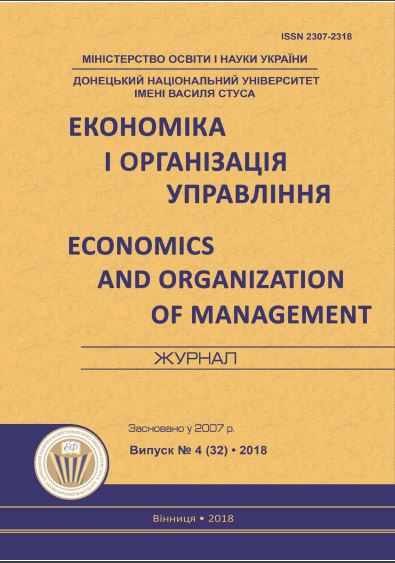Human resources of new economy: key components and efficiency of regulation.
DOI:
https://doi.org/10.31558/2307-2318.2018.4.1Keywords:
human resources, new economy, knowledge, intelligence, creativity, educational potential, competitiveness, innovative developmentAbstract
In the article the priority directions of the regulation of human resources of the new economy are identifies. The features of the mutual influence of the development processes of the economy of a new type and the formation of human resources in the context of perspective requirements for their quality are established, which determines not only efficiency in traditional types of labor, but the ability to learn and build, search for alternative options for combining resources to successfully adapt to their own needs and generating new knowledge. It is determined that the totality of intelligence, inspiration and intuition comprehensively determine a person’s ability to produce productive, creative work, the ultimate goal of which is the creation of knowledge - the basic resource for the growth of a new economy. It is substantiated that an important direction in the regulation of the human resources of the new economy is to ensure the competitiveness of the economy through the spread of knowledgeintensive activities and opportunities for innovative development. The key guidelines for the formation of human resources for the new economy were identified: the concept of lifelong learning is acquiring new aspects, according to which learning does not end with obtaining formal qualifications, provided that the approved educational institution program is fully implemented, but naturally accompanies the person in the workplace and at home; it is crucial to cultivate an innovative type of thinking and culture through the introduction of specialists to advanced social experience, modern practices and interaction technologies; new tools of influence also require the task of updating the system of values and motives of behavior, in particular, the values of education, the motivation to receive it, the activity of the individual.References
Бандур С. І. Стратегічні імперативи розвитку трудового потенціалу України / С. І. Бандур // Ринок праці та зайнятість населення. - 2013. - № 1. - С. 5-9.
Геєць В. М. Бар’єри на шляху розвитку промисловості на інноваційній основі та можливості їх подолання / В. М. Геєць // Економіка України. - 2015. - № 1. - С. 4-25.
Заяць Т. А. Розвиток регіонального освітнього менеджменту в контексті глобальних імперативів / Т. А. Заяць // Економіка і регіон. - 2013. - № 2. - С. 16-20.
Ільїч Л. М. Взаємодія ринків праці та освіти: сутність, характерні риси та модель функціонування / Л. М. Ільїч // Економіка та держава. - 2017. - № 4. - С. 69-74.
Кримова М. О. Оцінка конкурентоспроможності молодих фахівців з економічною освітою на ринку праці України / М. О. Кримова // Демографія та соціальна економіка. - 2015. - № 2. - С. 53-64.
Лісогор Л. С. Освітні чинники забезпечення інноваційного людського розвитку / Л. С. Лісогор // Науковий вісник Полтавського університету споживчої кооперації України. – 2008. – №3 (30). – С. 421-424.
Лаушкін О. М. Трансформація зайнятості в умовах нової економіки: дисертація на здобуття наукового ступ. канд. екон. наук (08.00.07) / Донецький національний університет (м. Вінниця) / О. М. Лаушкін. – Вінниця, 2015. – 373 с.
Human Development Report 2013. The Rise of the South: Human Progress in a Diverse World.
Студенты. Образ будущего [Електронний ресурс]. – Режим доступу: http://institute.gorshenin.ua/annuals/5_studenti_obraz_budushchego.html.
Shaulska L. Formation of educational potential of sustainable development / L. Shaulska, N. Yakymova // Scientific letters of academic society of Michal Baludansky. – Vol.3, №3. – 2015. – Р.140-146.
Шаульська Л. В. Стратегія розвитку трудового потенціалу України: монографія / Л. В. Шаульська / НАН України. Ін-т економіки пром-сті. – Донецьк, 2005. – 502 с.
Кузнецова Т. Компетенции идеального сотрудника / Т. Кузнецова // Управление персоналом. – 2009. – №5. – С. 23-27.

